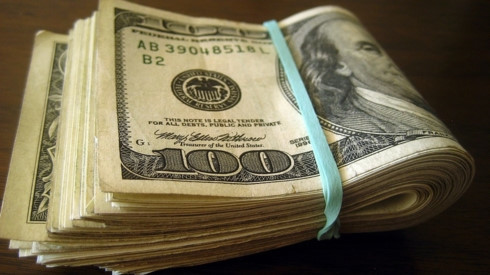VN central bank urged to speed up fight against dollarization
Fighting against dollarization will help stabilize exchange rate: experts
 |
In 2019, the SBV will continue to follow a road map on tightening foreign currency credit with a view of shifting from the borrowing to purchase of foreign currencies.
The State Bank of Vietnam (SBV) prescribed in a circular that firms are not allowed to borrow short-term loans in foreign currency to make offshore payments for imports which are used for domestic business and production.
Firms are required to shift from borrowing to purchasing foreign currencies for offshore payments or to borrow loans in VND. The lending of medium and long-term foreign currencies to make offshore payments will last until September 30, the central bank said.
This year, the SBV will continue to follow a road map on tightening foreign currency credit with a view of shifting from the borrowing to purchase of foreign currencies. In a bid to tackle the dollarization, the central bank has set a target of reducing the ratio of foreign currency credit to total outstanding loans and gradually putting an end to the lending of foreign currencies by 2030.
These moves aim to narrow both the deposits and loans in foreign currencies as well as stimulating the use of VND in line with the government’s guideline.
Economic expert Nguyen Tri Hieu noted that although anti-dollarization is vital to the economy, its outcomes fall short of expectations as a large number of residents and firms still put wild hopes on benefits from the use of USD for speculation and payments.
Hieu said that anti-dollarization naturally causes adverse effects on businesses, especially importers as they used to borrow USD loans at lower interest rates than those in VND. This results in a negative impact on their businesses and production, he added.
Furthermore, interest rates on VND loans remains quite high, at a range of between 9 to 13 per cent per year, much higher than those seen in developed countries.
Despite this, the expert stated that anti-dollarisation is believed to bring benefits for the Vietnamese economy as the country inclines towards using merely VND for payments and transactions nationwide.
Tightening foreign currency credit is needed to stabilize the USD/VND exchange rate and lessen the potential risks from USD speculation.
Meanwhile, economic analyst Bui Quang Tin emphasized that anti-dollarisation is a must in order to protect the value of VND amid the overuse of USD.
Tin said that there should be a warning if the ratio of foreign currency deposits over broad money (M2) climbs to 30 per cent. Although the nation’s dollarization rate now remains low, at 10 per cent, it is likely to surpass the current level and skyrocket if controls are not tightened amid high demands for loans and an accumulation of USD, he warned.
“The tight, effective control of foreign currency credit and anti-dollarization would help to retain the value of VND, thus enabling the central bank to improve the efficiency of its monetary policy and make adjustments to VND interest rates and exchange rates,” the analyst said.
The SBV has net purchased some US$6.2 billion in foreign currency reserves since the beginning of this year. A possible scenario for the abundant supply of foreign currencies is thought to be if the country continues to post a trade surplus in 2019 (a US$7.2 billion trade surplus seen in 2018), increasing remittances flows, and the upward disbursement of foreign investment capital.
VOV
 Anti-dollarization is urgently needed to protect the value of the nation’s currency and to minimize the adverse impacts that dollarization could place on the economy, experts have said.
Anti-dollarization is urgently needed to protect the value of the nation’s currency and to minimize the adverse impacts that dollarization could place on the economy, experts have said.